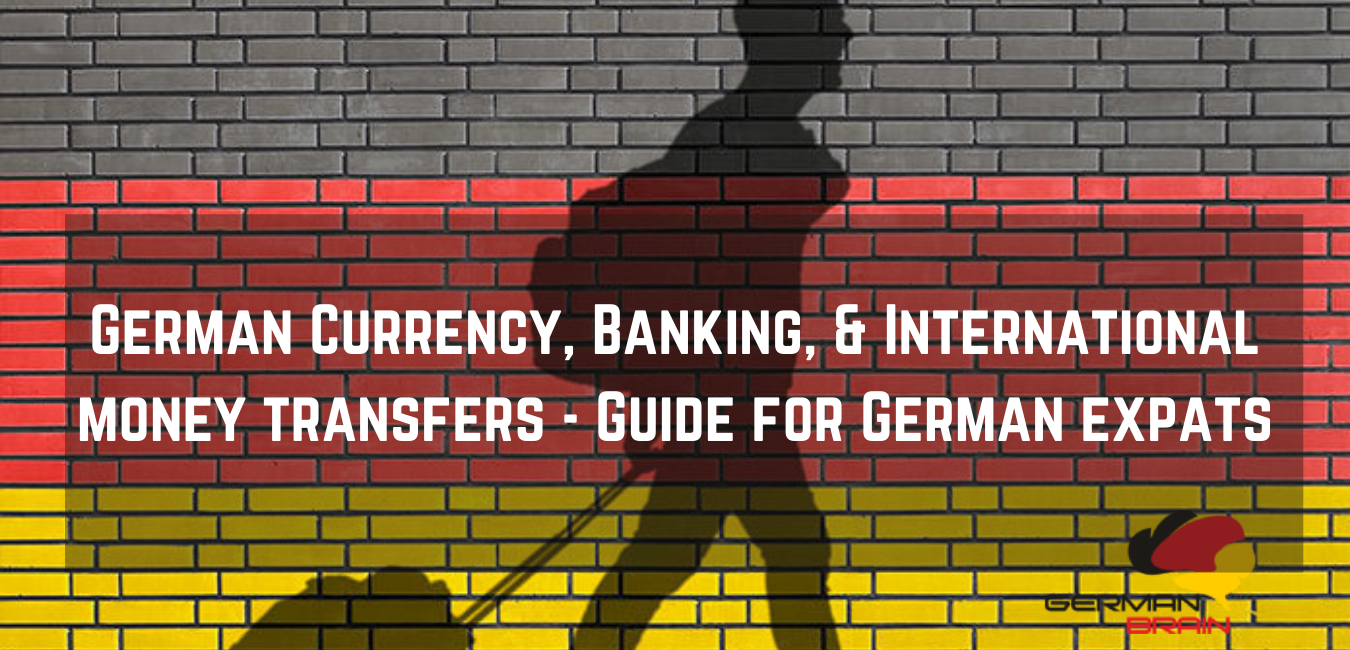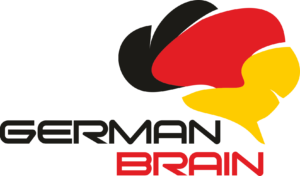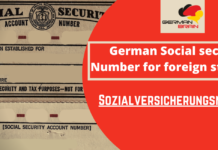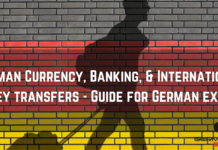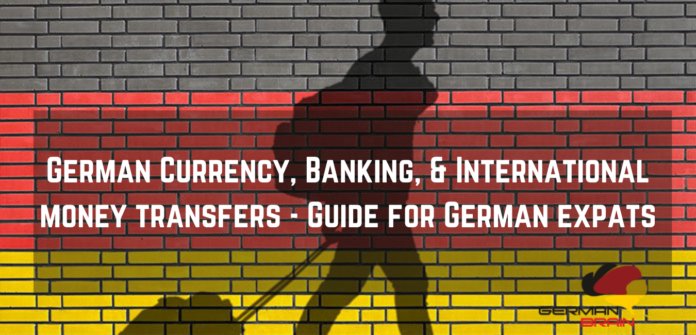Table of Contents
Germany has the best education policy with high standards of education, attracting students from across the globe, which later translated into efficient human resource.
If you have opted for Germany, you will need a bank account. Banking rules are quite strict in Germany, and if you are a non-resident, it might get really difficult, unless you have a corresponding bank account.
Related Readings:
- Germany Job Seeker Visa Information And Application Process In 2020
- German Student Visa Guide For International Students
Which currency is used in Germany?
Germany uses the euro (EUR, €) as its only currency, along with 23 other countries that use this common European money. One euro is comprised of 100 cents.
Facts about the Euro (German Currency)
- The euro is represented by the symbol €.
- €1 is further divided into 100 cents.
- The Euro was introduced as cash currency in Germany on 1st January 2002
- Euro banknotes are issued in €500, €200, €100, €50, €20, €10, €5 notes.
- Denominations of Euro coins are €2, €1, 50c, 20c, 10c, 5c, 2c, and 1c.
- Since early 2019 the 500 Euro note is not issued anymore. Of course, the notes are still valid.
- All Euro coins have a common side showing their value, while the national side shows an image chosen by each country.
- The notes of different denominations are printed in different colors. €5 comes in grey, €10 is printed in red, €20 in blue, €50 in orange, €100 in green, €200 in yellow, and €500 comes in purple.
Useful words to do with banking, in German and English.
| English | German |
| Bank | die Bank |
| Bank account | das Bankkonto |
| Bank balance | der Kontostand |
| Bank charges | die Bankgebühren |
| Bank draft | die Bankratte |
| Bank loan | das Bankdarlehen |
| Bank rate | der Diskontsatz |
| Bank statement | der Bankauszug |
| Bank transfer | die Banküberweisung |
| Bounced cheque | der geplatzter Scheck |
| Cheque book | das Scheckbuch |
| Credit balance | das Guthaben |
| Exchange rate | der Wechselkurs |
| Exchange Bureau | die Wechselstube |
| Interest rate | der Zinssatz |
| Travellers’ cheques | der Reisescheck |
Types of the bank you can open an account within Germany
- German bank
- Public savings bank (Sparkassen)
- Cooperative bank (Volksbanken/Raiffeisenbanken)
- International bank, or
- An online bank (direkt bank).
Types of German bank account
Current account (Girokonto)
This is a current account, which is the standard type of bank account in Germany, used to receive pay-checks as well as pay bills. German banks tend to offer both, general current accounts as well as specialized accounts (for students and youth).
Savings account (Sparkonto)
These can be either instant access (Tagesgeldkonto) for saving money or fixed deposit (Festgeldkonto), which is a higher interest account with a minimum deposit and a fixed period that the money has to stay in the account. Savings accounts can usually be opened by either German residents or non-residents from abroad.
Non-resident account – German bank account for non-residents
Standard current accounts are generally only available to German residents. You typically need to have a permanent address in Germany to open an account. Many online-only and mobile-only German banks also offer accounts to those living overseas. These are useful for those planning to move to Germany or those who work in Germany.
The requirement for opening a German bank account for non-residents
Normally, for opening a German bank account in a classical German Bank you would need to:
- verify your identity
- check your credit history.
How to verify your identity for opening a German bank account
In order to verify your identity, there are different options available (depending on the bank)
- PostIdent: Verify your documents at the German post office, where the clerk checks your identity. Travel to Germany is necessary.
- VideoIdent: Verifying your identity by a Video call using identification service used by the bank. But this option is only possible for certain nationality depending on your passport has all the necessary information for VideoIdent.
- Notary: Use a foreign bank or a lawyer in your home country to verify your identity. In this case no need to travel to Germany, but there are chances that the bank does not recognise the document.
Different category of non-residents
Some banks have allowed non-residents to open a bank account in Germany depending on their nationality or residence status to neighbouring countries. For ease, a non-resident has been categorised into four different categories below.
1. German Citizens living abroad
DKB bank still offers its services to any German citizen living abroad. Please check the link relating to DKB bank
2. Residents of German-speaking countries (Austria or Switzerland)
- DKB bank is open to residents of German-speaking countries of Austria or Switzerland. Please check the link relating to DKB bank.
- N26, a modern bank account a free bank account to residents of Austria.
- Other options for Austrian residents, please check Banks-Austria.com
3. Residents of EU Countries
- N26 (formerly Number 26) – if you are a resident of Austria, Ireland, France, Spain, Italy, the Netherlands, Belgium, Portugal, Finland, Luxembourg, Slovenia, Estonia, Greece and Slovakia. Please see below
4. Other Citizens living outside Germany (outside EU)
Transferwise Borderless Account provides a Euro Bank with an IBAN number which can be opened entirely online.
The Best Expat Recommended Banks in Germany
It’s actually pretty simple to open up a bank account even without speaking German AND without even living in Germany yet.
N26 – German neobank headquartered in Berlin, Germany.
N26 takes pride in the fact that it will literally only take you 8 minutes in total to open up a bank account with them online. It is one of the most popular mobile banks for expats in Europe and, it is extremely easy to navigate via the app. The entire site is run in English and once you’re registered, all of your banking can be done straight from your phone or laptop.
- Cost: FREE
- Includes: FREE Maestro card and FREE Mastercard credit card
- Withdrawing Money: You can withdraw money from any ATM up to 5 times/month for free and at more than 9,000 retail locations in Germany including shops like Penny, Real- and REWE.
BUNQ
Bunq is one of the newest “revolutionary” mobile banks targeting English speakers directly. Setting up an online bank account at Bunq can be done in just about 5 minutes. What sets Bunq apart from other banks is their unique budgeting system and their privacy agreements (your data is 100% safe with them).
- Cost: 7,99/month
- Includes: A combination of up to 3 cards – Maestro, Mastercard debit and/or bunq Travel Card (Mastercard credit)
- Withdrawing Money: You can withdraw money from any ATM up to 10 times/month for free and at more than 10,000 different locations across Europe.
DKB – DEUTSCHE KREDIT BANK
Similar to N26, DKB is a completely online bank, but if you’re comfortable doing all of your banking completely online, DKB offers some of the cheapest rates and one of the best services for expats.
- Cost: FREE
- Includes: FREE EC-Card and FREE Visa credit card
- Withdrawing Money: You can withdraw money from any ATM machine for FREE worldwide (great for expats looking for travel outside of Germany)
COMDIRECT – Comdirect Bank Aktiengesellschaft
Almost exactly the same as DKB and N26, Comdirect is a completely online banking system which means there are no branches to actually visit in person. They are well known for their easy application process which doesn’t demand many pre-requirements before registering, making it a much easier bank to apply to for expats.
The application process is run in German, but with a little Google translate, you’ll be able to easily guide yourself through the application.
- Cost: FREE
- Includes: FREE Girocard and FREE Visa credit card + Signup bonus of up to 150 Euros
- Withdrawing Money: You can withdraw money from over 9,000 bank machines across Germany at the following partner banks: Commerzbank, Deutsche Bank, HypoVereinsbank and Postbank, as well as at any Shell gas station or with 13,000 other partner shops around Germany
ING-DiBa – Germany’s third-biggest bank by the number of customers
ING-Diba is another online bank. The application is done completely online, you will confirm your identity using their webcam confirmation service or via post. While ING-Diba might not have as many benefits as Comdirect or DKB, they are still a great bank with great services.
- Cost: FREE
- Includes: FREE Girocard and FREE Visa credit card
- Withdrawing Money: You can withdraw money at any of their partner retail locations (from 20 Euros and up) including DM, Netto, ALDI Süd, REWE, Penny and toom Baumarkt
COMMERZBANK – Commerzbank Aktiengesellschaft
Commerzbank was the only bank that made our list of top expat favourites that offers physical branches in Germany! That’s probably because it has constantly won numerous awards for being one of the best banks in Germany. So, if having a local branch is important to you, Commerzbank is a great choice.
- Cost: FREE
- Includes: FREE EC-Card + Signup bonus of 100 Euro (though this sale could end)
- Withdrawing Money: You can withdraw money from any of the partner banks who are a part of the CashGroup: Commerzbank, Deutsche Bank, HypoVereinsbank, and Postbank
Sending Money to or from Germany and Europe
The best way to transfer funds internationally depends on several factors. The method you use will depend on the amount, type, timing of the transaction, and security.
There are three main kinds of providers of international currency transfers:
- Banks
- Remittance services and
- FX transfer companies.
Each option has its own advantages and disadvantages.
Best options for international money transfers to/from Germany
#1 – GO DIRECTLY THROUGH THE BANK
The fees are charged at each end for international transfers
Transfers are typically a lot more affordable (if not free), quick & easy to do if
- Sending the same currency, or
- Sending a money transfer within the European Union
If you’re sending money overseas, avoid money transfers with the bank completely.
#2- OLE’ FAITHFUL MONEY TRANSFER SERVICES (WESTERN UNION)
Western Union does still stay true to their fast service.
If you are in immediate need of funds (or someone else needs your support quickly), then Western Union is a great option, but you will pay the price for it.
If your transfer isn’t as urgent, stay away from sending via Western Union and save yourself the money by finding an alternative method.
#3 – USE PAYPAL
PayPal is a great option to send money between friends and family members for free (but only if you are within Europe and sending money in the same currency).
If you are sending money internationally, you’ll be paying international fees (2% or more per transaction) plus a fixed PayPal fee and 2.9% – 7.4% fees if you’re transferring from a credit card.
#4 – NEW ONLINE TRANSFER SERVICES LIKE CURRENCYFAIR, TRANSFERWISE, AND TORFX
They’re all free of hidden costs, they all offer the real exchange rates (awesome) and, there are no fees to change currencies.
The way they work is:
- You send the money to the transfer service company in your original currency, avoiding exchange rate fees from the bank
- The company will give you the exchange rate you agreed upon and you’ll be able to see it in dollar value without even setting up an account
- Then, the company will release the money to the bank of your choice in the currency you requested.
The great thing is that the competition in the online transfer market is high, which means companies may be willing to offer you better rates than you found on their website initially, simply because they want to beat out their competition.
Cost of sending money abroad
No matter which type of money transfer service you use, the final cost you pay is always determined by a combination of four factors.
- The transfer fee charged by the bank or transfer company
- The amount of money you are transferring
- The speed of the transfer
- The currencies involved and the exchange rate at the time of the transfer
The great thing is that the competition in the online transfer market is high, which means companies may be willing to offer you better rates than you found on their website initially, simply because they want to beat out their competition.
